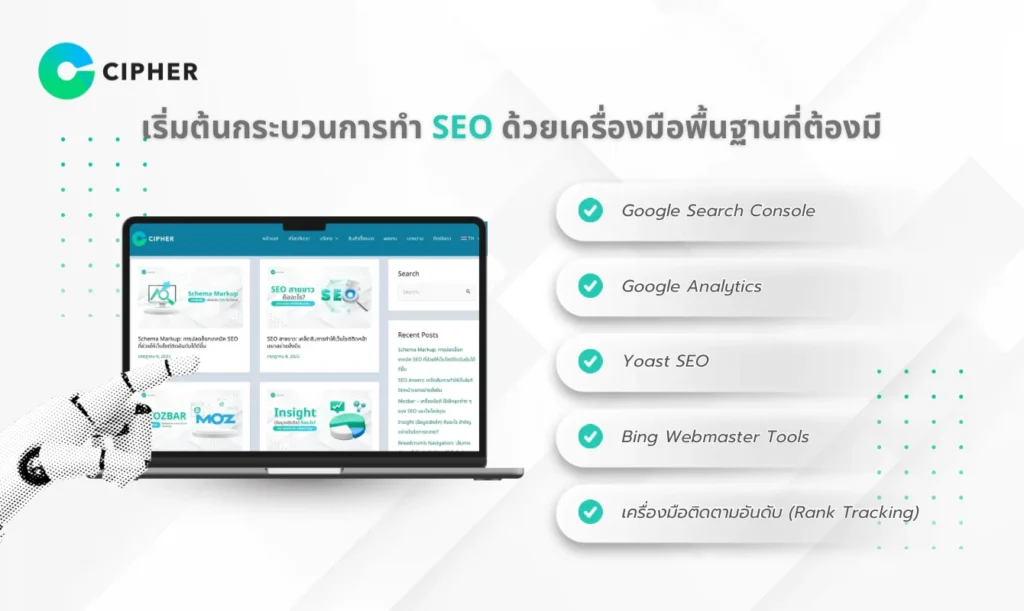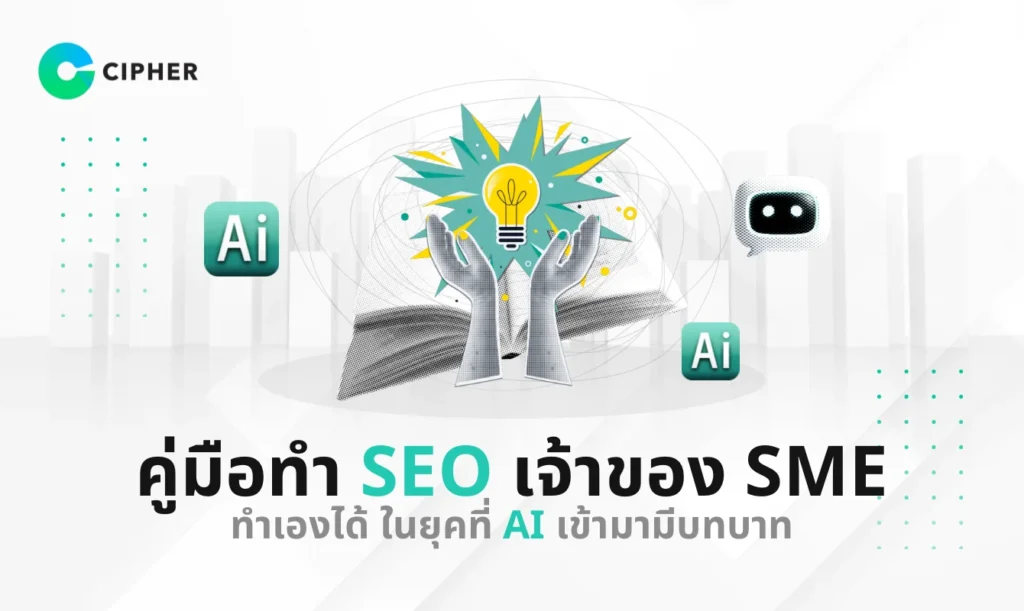SEO in 2025 is no longer just for big websites! SME owners can also establish their presence in the online world, especially in an era where AI is rapidly transforming the digital marketing landscape. This article will dive deep into a comprehensive SEO process that will help your website sustainably rank on Google, even if you’re a small business owner with limited budget.
Want to learn more about SEO basics in an easy-to-understand way? Read more at Easy SEO Guide
Table of Contents
Why is SEO Important for SME Owners?

Many might think SEO is beyond their reach, but in reality, it’s a key that can help transform your small business and drive exponential growth, especially in today’s volatile economy. Let’s look at the benefits of Google SEO for your business:
- Increased visibility: Makes your business widely known, even if you’re a small shop in a side street
- Attracts target customers: Reaches people who are specifically looking for the products or services you offer
- Builds credibility: Websites with high Google rankings typically earn more customer trust
- Cost-effective: Compared to buying ads, SEO provides better long-term value
- Competitive edge: Small businesses can compete on equal footing with larger companies online
SMEs in Europe that effectively use SEO have seen sales increases of up to 30%, according to a report by RankUp Digital, showing that SEO is no longer beyond reach.
Understanding Target Audience Personas: The Key to Successful SEO
Types of Personas Commonly Found in Online Searches
1. The Hasty Buyer
- Characteristics: Searches in a hurry, wants to purchase products or services quickly
- Search behavior: Uses highly specific keywords, such as “computer store near me open on Sundays”
- Appropriate SEO techniques: Use Local SEO, focus on clear information about prices, location, operating hours, and contact channels
2. The Researcher
- Characteristics: Wants in-depth information before making a purchase decision
- Search behavior: Uses long queries, such as “which computer is best for graphic design with a 30,000 baht budget”
- Appropriate SEO techniques: Create comprehensive content, product comparison articles, detailed reviews, FAQs
3. The Problem Solver
- Characteristics: Is experiencing a problem and needs a solution
- Search behavior: Often uses words like “how to” or “fix,” such as “how to fix a frozen computer” or “fixing overheating laptop”
- Appropriate SEO techniques: How-to articles, tutorial videos, step-by-step troubleshooting guides
4. The Trend Follower
- Characteristics: Wants to follow the latest trends
- Search behavior: Often uses words like “latest,” “trend,” or the current year, such as “fashion trends 2025” or “newest smartphone models”
- Appropriate SEO techniques: Frequent content updates, articles about trends, latest industry news
5. The Bargain Hunter
- Characteristics: Wants the best value for money
- Search behavior: Often uses words like “sale,” “coupon,” “promotion,” or “cheap,” such as “mobile phone discounts and promotions”
- Appropriate SEO techniques: Regularly update promotion information, create specific pages for special offers
How to Create and Use Personas for Maximum SEO Benefit
- Collect data from real customers: Interview or survey your current customers to understand their needs and problems
- Analyze data from Google Analytics: See where your website visitors come from, what they search for, and which pages interest them the most
- Create detailed personas: Define names, ages, occupations, problems they need to solve, and goals for each persona
- Adjust your SEO strategy based on personas: Create content and choose keywords that address each group
- Test and improve: Measure whether the content you create meets the needs of each type of persona and continuously improve
Example Persona for an Organic Restaurant:
“Ms. Nida – Health-Conscious Housewife”
Age 35, has 2 children, works part-time
Concerned about chemicals in food, wants healthy meals but doesn’t have time to cook
Searches for “organic restaurant near home,” “chemical-free children’s menu”
Understanding these diverse personas will help SME owners create more comprehensive and targeted SEO strategies, creating content that addresses customer needs at every stage of the buying decision process.
Starting the SEO Process with Essential Basic Tools

Before diving into Google SEO, we need to set up the right tools to work efficiently. The good news is that most of these tools are free! No need to worry about costs for SME owners:
- Google Search Console – The heart of SEO that helps you see how your website appears in Google search results. You’ll know what terms people search for to find your site and what technical issues need fixing.
- Google Analytics – A tool for analyzing visitor behavior on your website. It tells you who visits your site, where they come from, which pages interest them most, and how long they stay. This information is invaluable for improving your website.
- Yoast SEO – A popular plugin for WordPress and Shopify websites that helps you optimize SEO easily, even without much technical knowledge. It’s like having a personal SEO consultant on your website. Check out how to use Yoast SEO basics at Complete Yoast SEO User Guide
- Bing Webmaster Tools – Don’t overlook Bing! Although not as popular as Google, it has over 100 million daily users, representing an opportunity to increase sales that shouldn’t be missed.
- Rank Tracking Tools – Such as Ahrefs, help you know where your website ranks for various search terms, to measure success and adjust strategy promptly. See how to use Ahrefs to analyze competitors at Techniques for Using Ahrefs to Analyze Competitors
Keyword Research Techniques That Work for SME Businesses
1. Understand Your Target Customers Before Choosing Keywords
You need to know your customers well before starting keyword research by asking yourself:
- What are your customers like (age, gender, occupation, interests)
- What problems do they typically face that your business can help solve
- What language do they use when searching for what they need
- Which online platforms do they use
2. Use Simple Techniques for Finding Keywords
You don’t need to invest in expensive tools. SME owners can try these methods:
- Google Suggest – Just type a main word related to your business in the Google search box and look at the suggestions that appear below. These are keywords people are actually searching for!
- Search in Online Communities – Try looking in Facebook Groups, Pantip, Reddit, or forums related to your business. See what problems or questions people are discussing and turn them into keywords.
- Question-based Keywords – Use free tools like Answer The Public to see what questions people typically ask about your business.
- Long Tail Keywords – Focus on specific keywords. Instead of using “Thai restaurant,” try “authentic Thai restaurant in Thonglor area.” This will have less competition and better target your audience.
- Use Ahrefs for Free – You can use Ahrefs’ Keyword Explorer for free in some sections to find keywords with low competition.
On-Page SEO Techniques SME Owners Must Complete
1. Optimize URLs to be Short and Include Keywords
Good URLs should be short, concise, and include important keywords. For example, instead of using:
www.yoursite.com/blog/post/2025/08/01/12345
Use:
www.yoursite.com/seo-for-sme-2025
2. Manage Title Tags and Meta Descriptions Cleverly
These are the parts that appear in Google search results:
- Title Tag – Should be 50-60 characters long, place keywords at the beginning, and add attractive words like “How to…”, “Complete Guide…”, “# Hot Techniques…”
- Meta Description – About 150-160 characters, explaining what readers will get from the content, with keywords and a Call to Action
3. Structure Content with Heading Tags (H1, H2, H3)
Using Heading Tags not only helps Google understand your content structure but also makes it easier for readers:
- H1 – Use only once per page as the main title
- H2 – Use for main sections
- H3 – Use for subsections
And don’t forget to include keywords in these Heading Tags!
4. Optimize Images for SEO
Beautiful images aren’t enough; you need to optimize them for Google to “see” them:
- Give files meaningful names, like “seo-for-sme-guide-2025.jpg” instead of “IMG12345.jpg”
- Add Alt Text that describes the image and includes keywords
- Compress file size as much as possible without losing quality for faster loading
5. Use Internal and External Links Wisely
- Internal Links – Link to other pages on your website (about 3-5 links per article)
- External Links – Link to reliable sources of information, such as government websites or news websites
6. Include Keywords Naturally
AI and SEO: New Tools for SME Owners
How Can AI Help with SEO?
AI can help in many aspects of SEO:
- Keyword Analysis: AI helps analyze search trends and recommend high-potential keywords
- Content Creation: Helps draft basic content, but should be customized with human expertise
- On-Page SEO Optimization: Suggests ways to improve Titles, Meta Descriptions, and content structure
- Competitor Analysis: Finds strengths and weaknesses of competitors to identify marketing gaps
Learn more about AI-SEO at What is AI-SEO? and Increase Sales with AI-SEO
Techniques for Using AI Most Effectively for SEO
- Use AI for Data Analysis: AI can quickly process large amounts of data, helping you understand user behavior and market trends
- Combine with Human Expertise: AI is just a tool; you still need to apply your experience and understanding of your business
- Continuous Improvement: Use AI to track results and suggest improvements, keeping your SEO strategy always up-to-date
Creating Content That Wins Over Both Google and Readers for SME Owners
1. Create Comprehensive and Deep Content
2. Divide Content for Easy Reading
No one wants to read a wall of text. You should divide content with:
- Clear headings and subheadings
- Short paragraphs (no more than 3-4 lines)
- Bullet points and numbered lists
- Emphasize important text with bold or italic
3. Use Multimedia to Increase Interest
Add various elements to attract attention and increase the time readers spend on your site:
- High-quality images
- Infographics that summarize important data
- Short, relevant videos
- Quizzes or interactive tools
4. Create Trending Content That Doesn't Quickly Become Outdated
Mix trending content with evergreen content:
- Write about topics of current interest but provide deeper insights than others
- Regularly update old articles, especially statistics and technical information
- Add new content to old, well-performing articles and “relaunch” them
5. Use AI Intelligently in Content Creation
AI can help increase content creation efficiency, but it must be used appropriately:
- Use AI to find ideas and create article outlines
- Let AI help expand on certain points, but verify accuracy
- Add real experiences, case studies, and personal opinions to differentiate
- Don’t rely completely on AI, as Google may detect and penalize this
Technical SEO for SME Owners Without Needing a Programmer
1. Improve Website Loading Speed
Slow-loading websites cause people to leave before seeing your products or services:
- Check website speed with PageSpeed Insights (free tool from Google)
- Compress images to smaller sizes with free tools like TinyPNG
- Reduce the number of unnecessary plugins (for WordPress websites)
- Consider using free CDN services like Cloudflare Basic
2. Make Your Website Mobile-Friendly
Today, people use mobile phones to search for products and services more than computers, so your website must display well on mobile:
- Use themes that support mobile display (Responsive Design)
- Check mobile display with Google’s Mobile-Friendly Test
- Make buttons large enough for fingers
- Ensure text is readable without zooming
3. Use HTTPS for Your Website
Google prioritizes security; websites using HTTPS have an advantage in rankings:
- Install an SSL Certificate (free service from Let’s Encrypt)
- If using web hosting services, most hosts have free SSL installation options
4. Fix Broken Links
Broken links frustrate users and Google:
- Use free tools like Broken Link Checker to find broken links
- Fix or remove non-working links
- Set up redirects for old pages that no longer exist
5. Use Schema Markup to Increase Chances of Getting Rich Snippets
Schema Markup helps Google better understand your content and may display special results in searches, such as star reviews, prices, or reading time:
- Use free Schema Generator tools like Schema Markup Generator
- If using WordPress, you can install Schema plugins like Yoast SEO or Rank Math
Building Quality Backlinks Without a Massive Budget
1. Create Content People Want to Share
Create high-value content that people want to share:
- Ultimate Guide articles that comprehensively cover a topic in detail
- Unique insights or research that no one has done before
- Infographics that make complex data easy to understand
- Free online tools or tests related to your business
2. Use Low-Cost Digital PR
Reach media and news websites without hiring expensive PR firms:
- Create press releases about innovations or new developments in your business
- Share your expertise through free channels like HARO (Help A Reporter Out)
- Contact bloggers or journalists who write about your industry
3. Be a Guest on Podcasts or Other Websites
Sharing knowledge in others’ spaces helps build backlinks and credibility:
- Offer to be a guest on podcasts related to your business
- Write articles for other websites as an expert (Guest Posting)
- Participate as a speaker in online workshops or webinars
4. Build Relationships with Influencers and Industry Experts
Collaborating with people in the same field helps build networks and backlinks:
- Mention experts in your articles, then notify them
- Interview experts and publish on your website
- Collaborate with non-competing businesses to create content
5. Analyze Competitors' Backlinks
Learn from competitors’ success:
- Use free tools like Ahrefs Backlink Checker (limited usage) to view competitors’ backlinks
- Contact those websites to request backlinks by offering better or more up-to-date content
How Do SEO and SEM Differ? Which Should SME Owners Choose?
SEO (Search Engine Optimization)
This involves optimizing your website to rank in natural search results without paying Google.
Advantages:
- Cost-effective in the long run (no pay-per-click)
- More credible, as users typically trust natural search results more than ads
- Sustainable results; even after stopping efforts, you can still maintain rankings for some time
Disadvantages:
- Takes longer to see results (may take 3-6 months)
- Uncertain results, depending on many factors
- Requires continuous effort
SEM (Search Engine Marketing)
This involves buying ads on Google Ads to make your website appear above natural search results.
Advantages:
- Quick results (within 24 hours)
- Controllable budget
- Precise targeting
- Suitable for short-term campaigns or new product launches
Disadvantages:
- Pay-per-click costs, with some keywords being expensive
- When you stop paying, ads disappear immediately
- Some users may automatically ignore ads
Which Should SME Owners Choose?
The answer is: Use both together, but emphasize SEO
- Short-term: Use SEM to make your website known immediately
- Long-term: Do SEO continuously for sustainability
- Budget allocation: Initially, you might use 70% SEM and 30% SEO, then gradually adjust to more SEO as your website starts ranking naturally
DIY SEO or Hire Experts? Perspectives for SME Owners
DIY SEO
Advantages:
- Save money, no monthly fees
- Learn new skills useful in the long run
- You understand your business best
- Can change strategy immediately without waiting for approval
Disadvantages:
- Takes time to learn, potentially causing your main business to miss opportunities
- Lack of expertise and experience in solving specific problems
- Need to constantly monitor changes in Google’s algorithm
- Results may not be as good due to lack of advanced tools and techniques
Hiring SEO Experts
Advantages:
- Saves time, allowing you to focus on your core business
- Get advice from experienced professionals
- Access to advanced tools and techniques you might not have
- Faster results because they use the right methods from the start
Disadvantages:
- High costs (might start at tens of thousands of baht per month)
- Might encounter low-quality service providers or those using techniques against Google’s rules
- Lose some control
- They might not understand your business deeply enough
Recommendations for SME Owners:
- Start by yourself – Learn SEO basics first to understand what experts are doing
- Do the easy parts yourself – Such as content writing, adjusting Title Tags and Meta Descriptions
- Hire experts for technical work – Such as Technical SEO and competitor analysis
- Consider hiring an agency when your business grows – When you have a larger budget, consider hiring full-service experts
SEO Services from CIPHER to Help Your SME Business Grow
At CIPHER , we understand the challenges SME owners face in the digital world, especially in an era where AI is rapidly changing SEO processes. We have comprehensive SEO services tailored to your budget and needs:
Free Website Analysis for SME Owners
Targeted SEO for SME Businesses
Local SEO Strategies for Specific Areas
Comprehensive SEO for All Devices
Easy-to-Understand Results Reports
Cutting-Edge AI-Powered SEO
Updating Old Content
SEO Focused on Actual Sales Increase
Professional Team Ready to Support SME Businesses
SEO Process for SME Owners in the AI Era
Google SEO for SME owners in the AI era is no longer difficult. Start with basic tools like Google Search Console and Yoast SEO. Understand your target audience personas to select appropriate keywords. Optimize On-Page SEO and create high-quality content. Use AI as an assistant but don’t forget to add personality, and consider hiring experts when your business grows. At CIPHER, we are committed to helping your business succeed online! Contact us today for a free website analysis.





